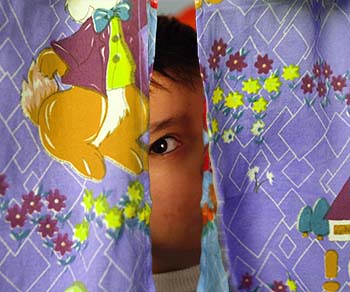The symptoms of Autism typically scale 3 areas of interest:
Social Behaviour
- Absence of social smiling: This is usually the first thing a mother would notice. Infants generally begin smiling and responding to social interactions by 2-3 months of age. But autistic infants fail to engage in these primary social dealings. They show a lack of social interest, do not respond to their names and begin talking late.
-
Loner behavior:
Autistic children, unlike other children of their age, prefer being alone and playing alone. They experience problems playing games with other children, and cannot make friends. They also cannot effectively respond to their parents’ demonstration of affection or anger.

- Interpretation of interactions: An autistic child is unable to understand the difference between displays of warmth, friendliness, annoyance and anger. A person saying “What are you doing?” out of curiosity and another saying the same thing in anger means the same thing to the autistic child.
- Handling emotions: Emotions can be overwhelming for the autistic patient. Because they cannot understand the complexities of emotions, they may burst into crying or aggressive behavior. Sometimes, the frustration can move inward where the patient may begin biting himself, pulling his own hair and head banging.
Verbal & Non-Verbal Communication
- Delayed speech: Most autistic children exhibit a delay in speech. They tend to babble and coo later than other children, and also find difficulty in learning and using gestures, pointing to objects and express their glee or discomfort.
- Language: Once an autistic child begins to speak, they may experience difficulty in knowing when to use which word. That is why their combination of words and usage in sentences will seem unusual to the listener.
- Echolalia: Many autistic children exhibit the trait of repeating whatever they hear, especially when they are asked any question. This is called echolalia. A severely autistic child will only repeat the question without following up with an answer, but a mildly autistic child will repeat the question and then answer it.
- Understanding non-verbal communication: Autistic children are unable to understand the nuances of non-verbal communication like tone of voice, body language, gestures and facial expressions.
- Dealing with conversations: Autistic patients find the day-to-day person-to-person talking too much to handle. Even if they have incredible vocabulary and can speak for hours on a particular topic given the chance, they are unable to hold conversations with people.
Stereotyped Behaviour
Autistic children commonly engage in stereotyped and repetitive behavioural patterns, simply because their activities are restricted to few areas.
They commonly manifest repetitive behaviours like wiggling their thumbs, rocking, arranging objects and repeating words or phrases. They also tend to get fixed in their activities and can spend hours only obsessed with one activity, like arranging toys in a straight line, piling tins neatly, etc.
They have an extreme aversion to any kind of change in their environment and routine, and find it very difficult to adapt to even the slightest of alterations. They tend to prefer having all objects kept in a fixed place in a fixed manner and can be consistent to the point to obsession and compulsion.
An autistic child can make any object / book / area of interest his focus of obsession and are preoccupied with it for days on end. For e.g. something as simple as a watch or a fan can catch their fancy, or they may have a fascination for numbers, dates, books or events.
Red Flags of Autistic individual:
- Doesn't smile to joyful expressions by 6 months or after
- No facial expressions by 9 months
- Doesn't babble by 12 months
- Doesn't point, show, reach to a object or wave by 12 months
- No words by 16 months
- Doesn't speak meaningful, two-word phrases (not including imitating or repeating) by 24 months
- Any loss of speech, babbling or social skills at any age















